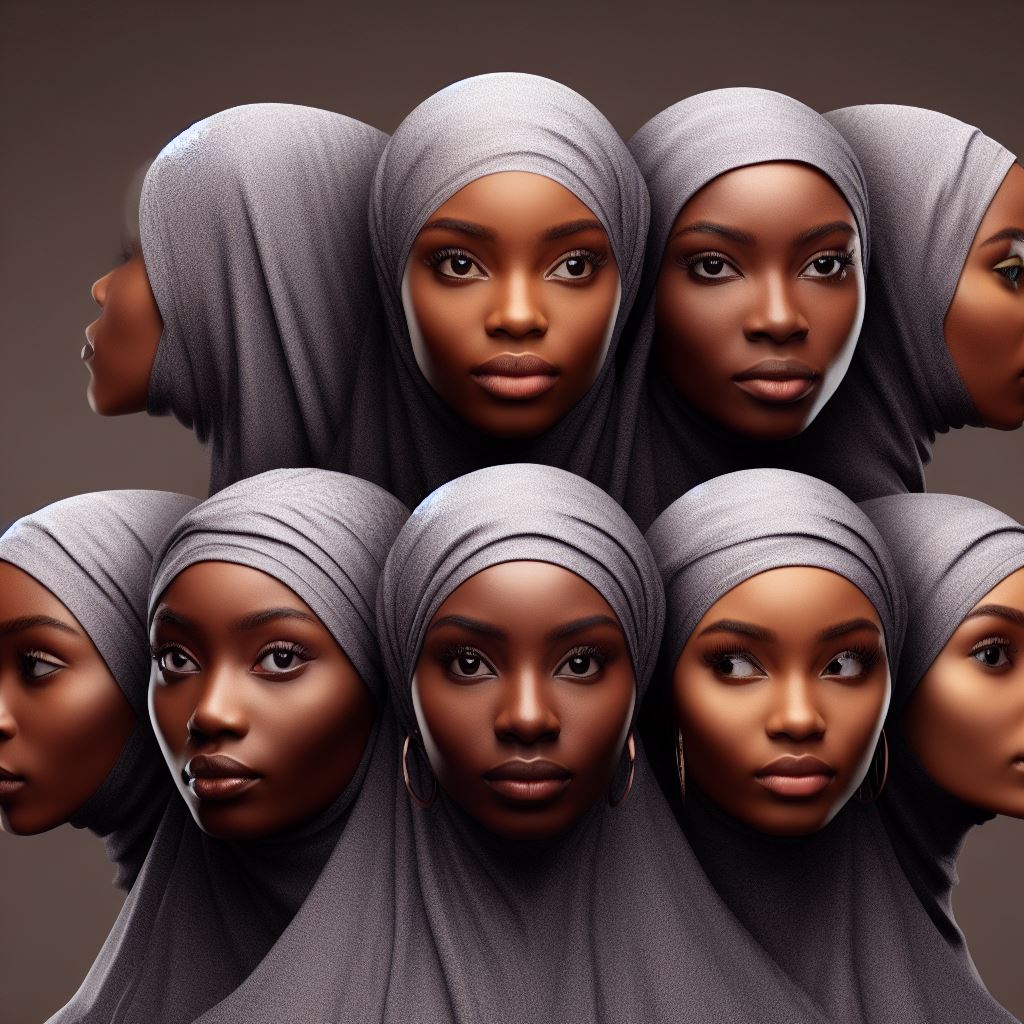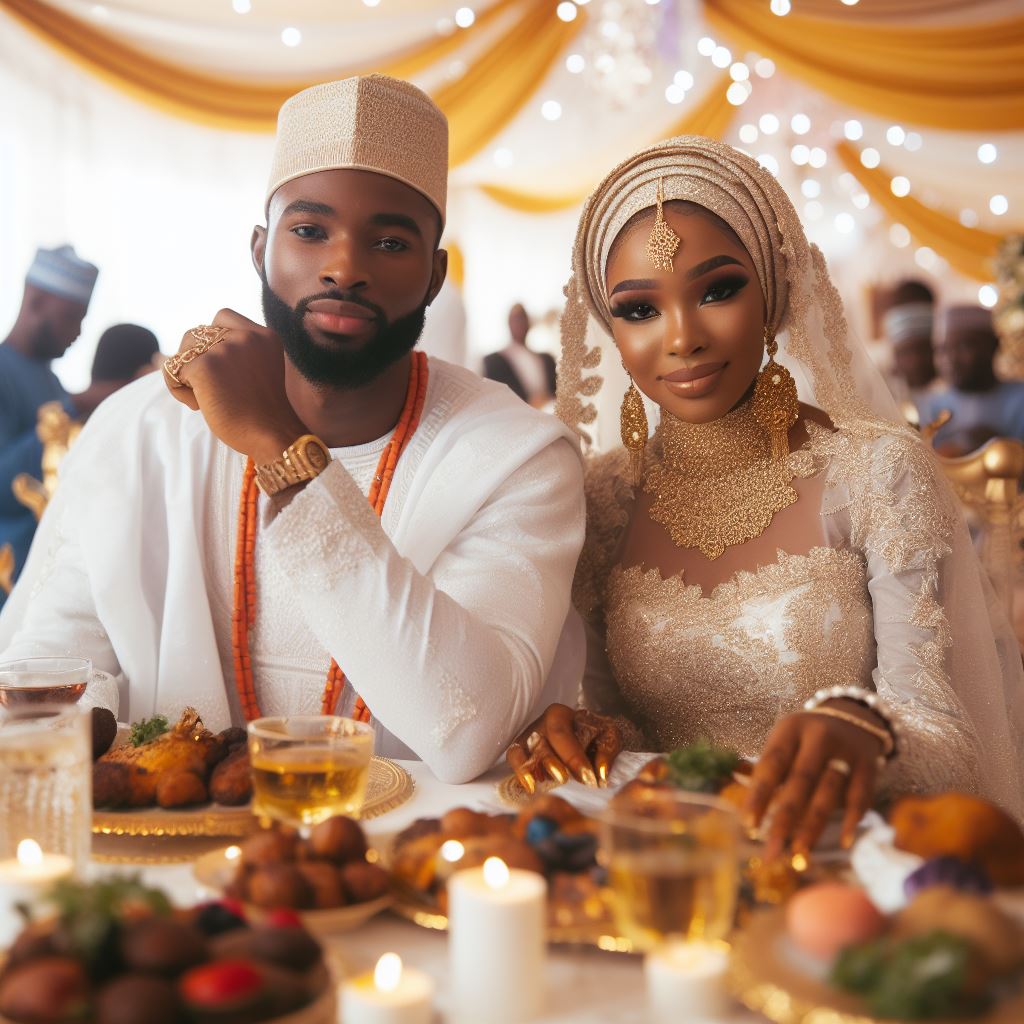Introduction
Polygamy in Islam
Polygamy, the practice of a man having multiple wives, has long been a contentious issue in Islamic societies.
Rooted in the Quran, it allows a Muslim man to marry up to four wives, with strict conditions.
This practice is often misinterpreted as encouraging unbridled polygamy.
However, it’s essential to understand the nuances and significance it holds, particularly in the context of Nigeria.
Polygamy in Nigerian Culture
In Nigeria, polygamy has deep-rooted cultural and religious significance.
It is not merely a matter of personal choice but reflects social, economic, and religious norms.
Many Nigerian ethnic groups have practiced polygamy for centuries, with the Hausa, Yoruba, and Igbo being prominent examples.
These cultures perceive polygamy as a means of ensuring lineage, managing agricultural workloads, and providing for the elderly.
Polygamy, within the Islamic framework, has also been seen as a way to support widows and orphans, adhering to the principles of compassion and community welfare.
This blog post will delve into the intricate facets of polygamy in Islam within the Nigerian context, addressing the misconceptions, cultural significance, and the contemporary debates surrounding this practice.
Quranic Perspective on Polygamy
Verses in the Quran that address polygamy
Polygamy is sanctioned in the Quran in Chapter 4, Verse 3, which states:
“And if you fear that you shall not be able to deal justly with the orphan girls, then marry (other) women of your choice, two or three, or four but if you fear that you shall not be able to deal justly (with them), then only one or (the captives and the slaves) that your right hands possess.”
This verse permits men to marry up to four wives, under the condition that they treat them with fairness.
Additionally, in Chapter 4, Verse 129, the Quran provides guidelines on how to maintain justice among multiple wives:
“You will never be able to be equal between wives, even if you should strive to do so.”
Here, it acknowledges the inherent difficulty of treating multiple wives equally, urging men to strive for justice, despite the natural imbalance.
Conditions and limitations set by Islam for practicing polygamy
Islam places several conditions and limitations on practicing polygamy:
- A man must have the financial means to support multiple wives adequately.
- Fairness in the distribution of time, resources, and emotional attention among wives is required.
- Consent from existing wives is necessary before marrying another woman.
- Polygamy can only be pursued if it leads to the well-being of all parties involved.
- A man must possess the ability to treat all wives with justice, though perfect equality is virtually impossible.
- Islam discourages polygamy if it will cause harm or create discord within a family.
By establishing these conditions, Islam seeks to ensure that polygamy is practiced responsibly and in the best interest of all parties involved.
Read: Protecting Your Rights: The Legal Power of a Marriage Certificate
Historical Context of Polygamy in Nigeria
Traditional Cultural Practices
- Nigerian traditional cultures have long embraced the practice of polygamy.
- It was customary for men to have multiple wives, a symbol of wealth and power.
- Polygamy was seen as a means to ensure lineage continuity and increase family labor force.
- Traditional cultural practices, such as bride price payment, played a role in facilitating polygamous marriages.
- Customary laws recognized and protected the rights of polygamous unions in Nigeria.
The Influence of Islam
- Islam arrived in Nigeria in the 11th century, bringing with it the concept of polygamy.
- The acceptance and practice of polygamy in Nigeria increased significantly with the spread of Islam.
- Islam permits men to marry up to four wives, under certain conditions.
- The Quranic verses that address polygamy emphasize fairness and justice towards all wives.
- The influence of Islam on marriage practices in Nigeria led to the spread of polygamy among Muslims.
- Muslim leaders and scholars played a vital role in promoting and justifying polygamy within Islamic teachings.
- Islamic marriage ceremonies and the inclusion of Islamic laws in Nigeria’s legal system further reinforced polygamous practices.
Polygamy in Nigeria has a long historical context rooted in traditional cultural practices and the influence of Islam.
Nigerian traditional cultures celebrated polygamy as a sign of wealth and power, while Islam introduced the concept and provided guidelines for its practice.
Understanding the historical context is crucial for comprehending the acceptance and prevalence of polygamy in Nigeria today.
Read: The Quran on Marriage: Key Verses for Nigerian Muslims
Reasons for Polygamy in Nigerian Society
It is important to recognize that polygamy in Nigeria is influenced by a combination of religious, economic, and social factors.
While Islam allows for polygamy, it is not the sole reason why some Nigerian Muslims practice it.
Poverty and limited economic opportunities also contribute to the practice, as polygamy can be seen as a practical solution to provide for multiple wives and children.
Polygamy is intertwined with social factors such as the desire for status and the strengthening of social networks.
Islamic reasons for polygamy as expressed by Nigerian Muslims
- Polygamy is allowed in Islam to fulfill the desire for companionship and to prevent adultery.
- Islam acknowledges that some men may have a greater need for sexual intimacy than others.
- Polygamy can provide an opportunity for men to care for women who might otherwise be left unsupported.
- Islam promotes the idea that a man can marry multiple wives if he can treat them all fairly and justly.
Economic and social factors contributing to the practice of polygamy
- In Nigeria, poverty and limited economic opportunities push some men towards polygamy.
- Polygamy allows men to have a larger workforce, which can be beneficial in agricultural societies.
- Polygamy can strengthen social networks and alliances between families.
- It is often seen as a status symbol and a sign of wealth and power in Nigerian society.
Misconceptions and stereotypes surrounding polygamy in Nigeria
- Not all Nigerian Muslims practice polygamy, and it is not exclusive to the Muslim population.
- Polygamy is a personal choice and might not reflect the true teachings of Islam for some individuals.
- Many polygamous marriages in Nigeria are harmonious and based on love, respect, and consent.
- Women in polygamous marriages can form strong bonds and support each other within the family structure.
Not all Nigerian Muslims practice polygamy, and it is not exclusive to the Muslim population
It is crucial to address misconceptions and stereotypes surrounding polygamy in Nigeria.
Firstly, not all Nigerian Muslims engage in polygamy, and it is a personal choice that varies among individuals.
It is essential to understand that the practice of polygamy might not reflect the true teachings of Islam for some individuals, as they may prioritize monogamy or choose to follow different interpretations of Islamic teachings.
Many polygamous marriages in Nigeria are harmonious and based on love, respect, and consent
It is essential to dispel the notion that all polygamous marriages are unhappy or oppressive.
Many polygamous marriages in Nigeria are based on love, respect, and consent.
Women within these marriages can form strong bonds and support each other within the family structure, challenging the narrative of polygamy as inherently negative for women.
Basically, polygamy in Nigerian society is influenced by Islamic beliefs, economic factors, and social dynamics.
Acknowledging the various reasons behind the practice and addressing misconceptions is crucial in understanding polygamy from Nigerian perspectives.
Read: Rights and Responsibilities: Husband-Wife Dynamics in Islam

Experiences and Perspectives of Nigerian Women in Polygamous Marriages
Interviewing Nigerian Women in Polygamous Marriages
To understand the concept of polygamy in Islam from a Nigerian perspective, we embarked on a journey to speak with Nigerian women in polygamous marriages.
Here are some of the stories and experiences we gathered:
Amina’s Motivation
Amina, a 35-year-old woman, shared that her decision to enter a polygamous marriage was driven by a desire for financial security.
She believed it would provide her children with better opportunities.
Fatima’s Challenge
Fatima, 28, highlighted the challenge of emotional stress.
The sharing of her husband’s affection and attention with other wives often left her feeling neglected and undervalued.
Ngozi’s Experience
Ngozi, a Christian who married into a Muslim polygamous family, faced the challenge of balancing her faith with her husband’s.
She appreciated the strong sense of community among co-wives but found it challenging to reconcile her beliefs with the practice.
Their Challenges and Overall Experiences
Emotional Struggles
Many women in polygamous marriages face emotional turmoil, dealing with jealousy, insecurity, and a sense of competition for their husband’s affection.
Financial Security
Several women, like Amina, mentioned financial stability as a key motivation.
Sharing the economic burden can ease the pressure on a single household.
Social Support
Ngozi emphasized the importance of a strong support network within the co-wife community, where women help and look out for each other.
Cultural and Religious Influence
Religious beliefs and cultural norms heavily influence the decision to enter polygamous marriages, making it a complex but deeply ingrained practice.
Generally, Nigerian women’s experiences in polygamous marriages are diverse.
While some find financial security and a sense of community, others face emotional challenges.
Understanding these motivations and obstacles is crucial to grasp the nuanced perspective of polygamy in Nigeria.
Read: Islamic Marital Counseling in Nigeria: Benefits & Places
Impacts of Polygamy on Nigerian Families
Effects on family dynamics and relationships
- Polygamy can disrupt the harmony within a family due to jealousy and competition among wives.
- This practice may lead to misunderstandings, conflicts, and even violence among family members.
- Wives may feel neglected or marginalized, resulting in strained relationships with their husbands.
- Shared resources, such as finances and time, may become a source of contention among wives.
- The complex nature of polygamous households can create a stressful and tense atmosphere for everyone involved.
- Communication breakdowns and lack of emotional support may further strain relationships within polygamous families.
- The presence of multiple wives can also hinder the development of a deep emotional bond between the husband and each wife.
- Power dynamics within the family structure may be skewed, leading to feelings of inequality and resentment.
Impact on children, particularly in terms of upbringing and emotional well-being
- Children in polygamous families may experience a lack of individual attention and parental investment.
- Division of resources and time can limit the quality and quantity of interactions between parents and children.
- The emotional well-being of children in polygamous families may be compromised due to the absence of a strong family unit.
- Children may feel a sense of competition among siblings, leading to feelings of insecurity and low self-esteem.
- The absence of a stable and harmonious family environment can impact children’s overall development and mental health.
- Conflicting values and inconsistent parenting styles may create confusion and turmoil for children.
- Children may struggle to form secure attachments with their parents and may have difficulties in forming healthy relationships later in life.
- Polygamy can perpetuate gender inequality and reinforce patriarchal norms, impacting children’s understanding of gender roles.
Essentially, polygamy can have significant negative impacts on Nigerian families.
It disrupts family dynamics, leading to strained relationships, conflicts, and emotional distress among wives and children.
The lack of individual attention, competition among siblings, and inconsistent parenting styles can adversely affect children’s upbringing and emotional well-being.
It is essential to evaluate these impacts when considering the practice of polygamy in Nigerian society.
Criticisms and Challenges of Polygamy in Nigeria
Different Viewpoints and Criticisms towards Polygamy in Nigerian Society
- Polygamy is often criticized for creating inequality and unfair treatment among wives.
- Some argue that polygamous marriages undermine the emotional and psychological well-being of women.
- Many view polygamy as a patriarchal practice that reinforces gender inequality and male dominance.
- It is often criticized as a tool for men to satisfy their sexual desires and ego.
- Some Nigerians condemn polygamy for its negative impact on children’s upbringing and family dynamics.
Contemporary Challenges Faced by Polygamous Families in Nigeria
- Financial strain is a major challenge faced by polygamous families due to increased expenses.
- Jealousy and competition among co-wives can lead to conflicts and tension within the family.
- Maintaining harmonious relationships between the husband and multiple wives can be complex and challenging.
- Children from polygamous families may struggle with identity issues and finding their place within the family.
- Legal issues surrounding inheritance and property rights often arise in polygamous families.
- Social stigma and discrimination against polygamy can affect the well-being and social standing of the family.
- Education and healthcare expenses can be a burden on polygamous families with limited resources.
- Polygamous families face societal pressure to conform to monogamous norms, leading to isolation and exclusion.
- Balancing time and attention among multiple spouses and children can be emotionally draining for the husband.
- Polygamy may lead to a lack of intimacy and emotional connection between spouses due to divided attention.
Conclusion
Recap of the main points discussed
- Polygamy is allowed in Islam as long as certain conditions are met.
- These conditions include fair treatment of all wives and financial capability.
- Nigerian perspectives on polygamy in Islam differ.
- Some Nigerians view polygamy as a cultural tradition and a means of reproductive support.
- Others criticize polygamy for potential exploitation and unequal treatment of women.
Considering the Nigerian context, polygamy in Islam is a complex issue with varying opinions.
While some Nigerians embrace polygamy as a cultural norm and a way to fulfill Islamic teachings, others raise concerns about gender equality and fairness in polygamous relationships.
In a nutshell, the concept of polygamy in Islam remains a topic of discussion and interpretation, especially in the Nigerian context.
It is crucial to acknowledge and respect diverse perspectives while also striving for equitable and just treatment within polygamous relationships.




